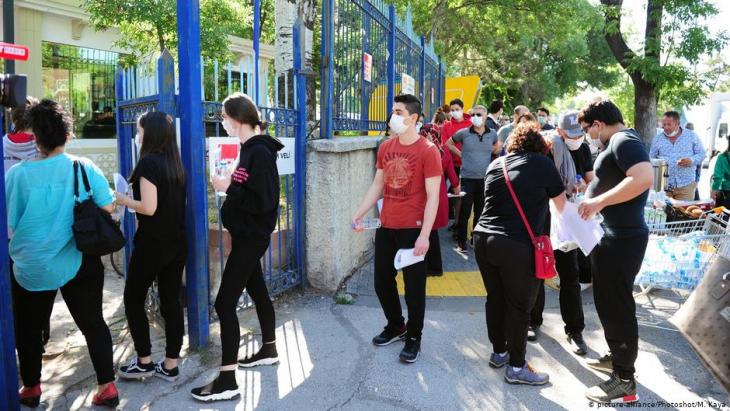Currently, everyone in Turkey is talking about Generation Z – a term that refers to those young people born around the turn of the millennium. It is a generation that knows no other Turkey than one ruled by Recep Tayyip Erdogan and his Islamic–conservative Justice and Development Party (AKP). And it is also a generation of digital natives who like to spend lots of time on social media.
The group recently got Turkey’s attention as the result of an obscure political decision that moved the date for the country’s annual college entrance exams – an existential test that youth across the country cram for every year – up a whole month, from late July to 27-28 June.
Students were furious because they suspected the move was nothing more than a gimmick to benefit the country’s ailing tourism industry, which has been is crisis mode since coronavirus first hit. Students say the plan is to get them to go on vacation – despite the ongoing threat of infection – since they will be finished with studying a month earlier than planned. The Turkish government denies such accusations.
Brought forward for economic reasons?
Many prospective students suspect that bringing forward the central examination for university admission was intended to revive the country’s tourism industry, which is in crisis due to the corona pandemic. By shortening revision time by one month, young Turks would have more time for holidays – despite the increased risk of infection. However, the Turkish government has denied this.
Recently, young Turks gave the president a taste of their disapproval as only they can. When Erdogan took to YouTube on the day before the exam for a “Meet with the kids” event, the nice words he used to address these potential voters fell on deaf ears. In fact, the youth tuning in were quick to voice their anger. Thousands blasted Erdogan, taunting him with real-time comments, only to then move on to the next platform – like Twitter, where they railed further and launched the hashtag campaign #OyMoyYok (Not getting my vote), which proceeded to spread like wildfire.
What do we know about Generation Z?
Since then, Generation Z has become the object of study. Essentially, the group consists of anyone born between the years 1995 and 2010. Estimates suggest that some 13 million young Turks fit into that group and that they could play a key role in future elections. Many will soon be able to vote for the first time, but no one really knows just how they tick.
A major study conducted by the Gezici Arastirma Merkezi Institute recently took a closer look at youth in 12 of Turkey’s 81 provinces. The main aim of the study was to get a picture of their attitudes toward religion, their worldview and their political leanings.
Decisive factor in 2023 elections
“This generation will be a decisive factor in the 2023 parliamentary elections,” says Murat Gezici. He says young voters will make up about 12% of the electorate, and can thus dictate some of the issues debated during the election – namely those of fairness and income.
Researcher Gezici says young voters are, “more environmentally friendly, empathetic, sensitive and thoughtful” than previous generations. Moreover, the study found these young voters also have influence over how their parents vote. Though the same does not work the other way around, with “87.5% saying their parents’ opinions have no influence on how they will cast their votes,” says Gezici, who adds that the country’s youth seems disinterested in traditional values.
In light of Turkey’s ongoing economic crisis, it seems highly unlikely that young voters will find anything inspiring in Erdogan’s AKP. According to the government statistics office, youth unemployment (ages 15-24) in the country has been hovering around 25% for months. That is why many qualified young Turks are simply leaving the country and heading to Europe – starting a brain drain that could have grave long-term consequences for the Turkish job market.
Journalist and academic Can Ertuna says it’s impossible to connect with young voters “the old way.” He says a new language needs to be found to address a generation that is more comfortable on social media than anywhere else: “We are talking about people who use YouTube as their browser and get their news via Instagram.” Ertuna adds that politicians desperately need to find more solutions to age-specific problems as well.
Political scientist Nezih Onur Kuru is highly critical of the government because the ruling AKP and the ultranationalist MHP spend most of their energy addressing only the issues that concern older, conservative, rural voters. He says that makes the gulf between those in power and the youth of the country unbridgeable: “The anger over the exams was a turning point. Just like parliamentary elections in 2023 will be a turning point – because that is when Generation Z will hold the balance of power.”
Excerpt from Deutsche Welle, link to full article here
